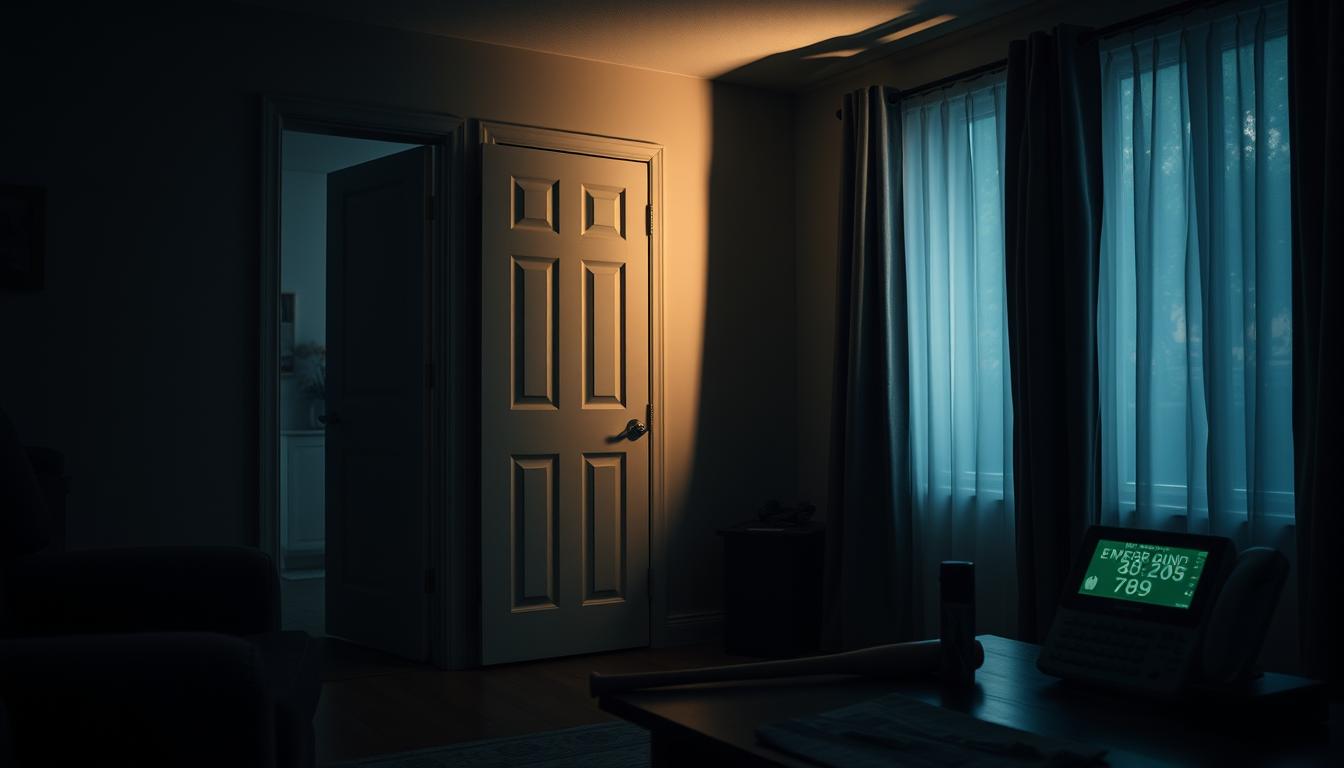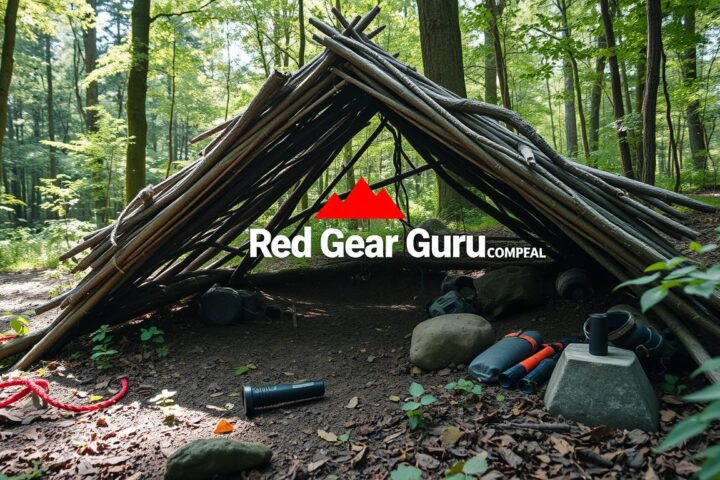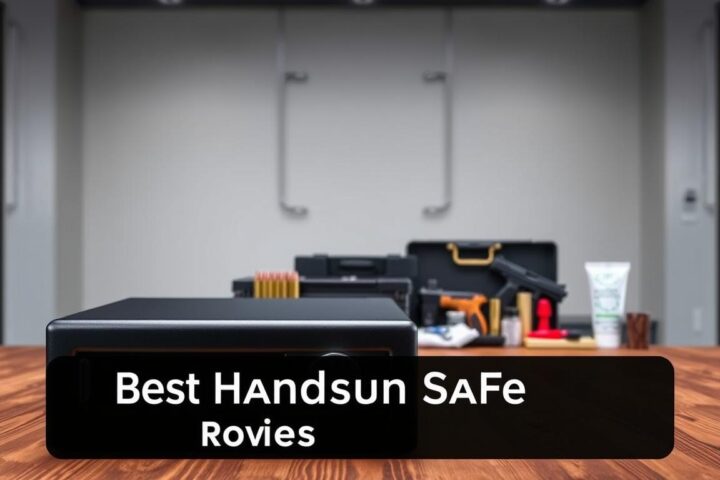Did you know that every 30 seconds, a burglary happens in the United States? This leads to over 2.5 million home burglaries each year. This shows how important it is to be ready and aware of personal safety during a home invasion1. To survive such a scary event, you need to be mentally prepared, think fast, and have a good emergency plan. Since 25% of burglaries happen when someone is home, knowing how to react can save lives1.
In this article, you’ll learn how to stay calm during an invasion and how to make your home safe. Knowing about home invasion robberies helps you prevent threats. So, emergency preparedness is key. Let’s explore how to survive a home invasion scenario.
Key Takeaways
- Every 30 seconds, a burglary occurs in the U.S., emphasizing the urgency for home safety measures.
- 25% of burglaries take place when residents are home, making preparedness essential.
- Remaining calm during a home invasion significantly increases the likelihood of successful survival.
- Investing in a robust home security system can deter intruders effectively.
- A well-developed emergency plan is vital for navigating the chaos of a home invasion.
Understanding Home Invasion Robberies
Home invasion robberies are serious crimes where intruders break in with the intent to harm or steal. They are more violent than regular burglaries and deeply affect victims. Sadly, many happen without warning, causing great harm2.
Knowing how intruders act helps us prepare for home invasions. Most people don’t think about how they’d react, which is scary. The first thirty seconds are key to staying safe3.
There are three main ways to react: fight back, give in, or stay calm and think. Having a plan is important, as many families don’t practice safety drills2.
To stay safe, we need to take steps to prevent invasions. Homes with strong locks and alarms are less likely to be targeted2. Having self-defense tools like pepper spray or stun guns is also helpful2.
Staying calm is key, as many people have successfully defended themselves by staying calm2. Screaming might not scare off intruders3. Instead, using calm words can help de-escalate the situation2.
Learning self-defense is very important. Many people learn about guns and tactics to protect their homes and families4. Knowing how to use a gun safely can greatly increase your chances of survival4.
Statistics Behind Home Invasions
Home invasions are a big worry in the United States. About 1.65 million happen every year. Sadly, 66% of these are violent crimes, showing a big risk to personal safety5.
Also, 38% of all assaults and 60% of rapes happen during home invasions. This shows how important it is to be safe and secure at home5.
Looking at home invasion stats helps us understand crime rates better. Most home invasions happen when someone is not expecting it, like waking up at night or coming home from a trip5. Many people think home invasions won’t happen to them, but the stats say otherwise5.
To stay safe, it’s key to use defensive strategies and be proactive about security. Gun rights discussions also intersect with women’s rights, showing the need for crime prevention6.
Preparing Your Home for Safety
To make your home safer, start with simple steps. Add extra locks on doors and windows to stop unwanted entry. Also, think about getting security systems like cameras and motion detectors. They watch your home and alert you to dangers.
Don’t leave valuable things where they can be seen. This makes it harder for burglars to find what they want. Use timers on lights and electronics to make it seem like someone is home. Plus, having a dog can help keep burglars away.
It’s important to know that safety starts with prevention. Always check and update your home’s safety plan. Make sure everyone in your family knows what to do in an emergency. This way, you all feel safe and ready to act together7.
For more tips, check out this survival skills guide from the Red Cross. It teaches you how to handle different emergencies.
By being proactive about home security, you can greatly reduce the chance of break-ins. This makes your home a safer place for everyone living there.
Developing a Home Security Plan
Creating a security plan is key for keeping your family safe. Start by checking your home for weak spots. Find safe ways to leave and set up a plan to contact each other in an emergency.
It’s important to know how to act in a crisis. Practice your emergency plan to feel more ready and confident.
Adding different security steps makes your plan stronger. Think about getting alarms that call the police right away. A good security plan has layers to stop, slow down, and defend against intruders8.
Make your doors safer by using longer screws for hinges. This slows down intruders. Also, put deadbolts on your doors for a cheap but effective way to secure your home8.
Learning survival skills is also important. Knowing CPR and how to treat injuries can save lives in emergencies9. Make sure everyone knows their part in an emergency. Check out emergency kit essentials to get ready.
In short, a good security plan for your family needs a careful look, proactive steps, and survival skills practice.
How to Stay Calm During an Invasion
When a home invasion happens, staying calm is key. People need to use their emergency plans and deep breathing to stay in control. This helps them think clearly and make quick decisions.
Panic can make things worse. But, staying calm lets you see your options better. You might choose to leave or hide until help comes.
Getting ready for emergencies is important. Training helps you feel more confident in scary situations. When you feel ready, you’re more likely to stay calm.
Learning to manage stress is crucial. It helps you make better choices and feel less shaken. Knowing that many people feel helpless in emergencies shows why we need to be prepared10.
Learning survival skills is important for safety. Tools like visualization and positive thoughts can help fight panic. Staying calm can greatly increase your chances of getting through a tough situation.
The Importance of Survival Skills
Survival skills are key for handling crises, especially in stressful times like home invasions. They include physical skills like building shelters and starting fires. Mental readiness and being aware of your surroundings are also crucial.
Emergency training teaches you how to handle dangerous situations. It covers first aid and how to start fires or signal for help. Knowing these skills can be a lifesaver11.
Practicing survival skills regularly is essential. Without water, a person can only last three to five days. Learning how to purify water is vital12. Survival skills also build self-reliance, helping you manage dangers on your own13.
Training boosts your confidence and ability to face unexpected challenges. The Red Cross offers courses with valuable tips for emergencies. They are a great resource for anyone wanting to improve their preparedness to learn more about survival education.

Actions to Take When an Intruder Enters Your Home
If an intruder enters your home, stay quiet and think carefully about what to do. Every year, about 3.7 million burglaries happen, with 1.03 million being home invasions. It’s vital to stay alert and understand the threat14. Call the police as soon as you can, using the best way to reach them.
If you must face the intruder, keep your safety first. Home invasions are fast, happening every two minutes on average14. Giving up your belongings might stop things from getting worse. The most important thing is to keep yourself and your family safe.
Knowing how to get out or hide can save your life. Learn your home’s layout and find safe spots. Places hidden from entry points can be lifesavers.
It’s also key to know your local laws. In places like California, you have the right to defend yourself at home15. Laws like “Stand Your Ground” and “Castle Doctrine” let homeowners protect themselves without needing to run away.
What Not to Do During a Home Invasion
When facing a home invasion, it’s key to avoid confrontation. This helps prevent violence from getting worse. Trying to fight back can put you in danger.
Don’t risk your life to save things. Keeping safe is more important. Make sure you have a phone ready to call the police in a safe room. This room should have important survival items16.
Don’t leave the safe room during an invasion. Staying there can help you survive16.
Thinking tactically can help you survive a home invasion. Use a family code word to act quickly in emergencies. This improves safety and coordination17. Also, keep your phone charged for emergency calls17.
Learning basic self-defense can prepare you for unexpected situations here’s how to stay aware and. Homes with security systems are less likely to be broken into. This is because they have better security17.
Waiting for the police to arrive is the best plan. Having a plan for escape and staying calm can greatly improve your chances. It can mean the difference between a safe outcome and a dangerous one.
Aftermath of a Home Invasion
Home invasions can deeply affect people, causing long-term psychological effects. Victims often feel more vulnerable, anxious, and fearful. This makes them question their safety at home. It’s important to find ways to recover emotionally and seek trauma support to help heal.
After such a traumatic event, it’s key to check and improve personal safety. About 1 in 5 homes face burglary or violent intrusion. This means burglaries happen every 15 seconds in the U.S18.. It’s vital to strengthen home security systems to prevent future intrusions.
Creating a family safety plan is also crucial. It should include how to escape together and protect each other during an invasion. This is based on interviews with violent criminals19. Clear communication about emergency plans and not complying with intruders is essential for safety19. After the event, focus on both physical security and emotional support.
Discussing home defense involves clear, practiced plans for threats. This keeps focus during stress, reducing confusion and panic20. As recovery progresses, talking about safe practices and security can empower survivors. By adopting these strategies, people can work towards feeling safe again.
Conclusion
Surviving a home invasion needs a mix of being ready, learning skills, and being mentally strong. Knowing how to prevent home invasions is key. This includes having a good home security plan and staying alert.
Learning basic survival skills like first aid and fire-starting is also important. These skills help keep you safe in tough times2122.
Having a family emergency plan is crucial. It makes sure everyone knows what to do in danger. Learning from experiences and staying open to new ideas helps you stay strong in scary moments. These steps help protect you and your family from home invasion risks23.
In short, survival is not just about being physically ready. It’s also about having the mental strength to stay calm and make smart choices. By staying informed and practicing these important skills, you can keep your family safer.
FAQ
What should I do first if I experience a home invasion?
Stay quiet and check the situation. Call the police quietly and focus on staying safe, not on your stuff.
How can I prepare my home to prevent a home invasion?
Make your home safer by adding locks and using security systems. Make sure doors and windows are locked. Hide valuable things and make it seem like someone is home to scare off intruders.
What survival skills can help during a home invasion?
Learn self-defense and stay sharp mentally. Practice survival skills and have a family plan for emergencies. This can help you stay safe.
Can confronting an intruder be a good idea?
No, it’s not a good idea to face an intruder. It can make things worse. It’s better to hide or find a way out than to try to save things or face the intruder.
What are the psychological effects of a home invasion?
Home invasions can cause long-term trauma and fear. Getting help from professionals can help you deal with these feelings and recover.
Why is it important to have a family emergency plan?
A family plan helps everyone know what to do in an emergency. It includes safe ways to leave and how to stay in touch.
How can I stay calm during a home invasion?
Take deep breaths and think about your emergency plan. Staying calm helps you make smart choices when things are stressful.
What immediate actions should I NOT take during a home invasion?
Don’t yell, try to fight, or make noise. These actions can make things worse. Instead, stay quiet, keep safe, and call the police quietly.
How can I reassess my home security after a home invasion?
Check your security setup and see if it needs improvement. Talk to experts if you need to. Update your emergency plan to make your home safer and prevent future attacks.
Source Links
- How to prevent and survive a home invasion – The Prepared
- Surviving a Home Invasion: Self-Defense Tips for Protecting Your Family – Mindful Defense
- Home Invasion Survival Improves with a Family Security Plan
- Surviving a Violent Encounter: Are you Prepared? – MV Tactical and Firearms Training
- Podcast #631: How to Prevent and Survive a Home Invasion
- Martial Arts Class Statistics | Numbers & Facts About Self Defense Classes
- Build A Kit | Ready.gov
- Three Layers of Effective Home Security – Survival Mom
- 11 Survival Skills That Could Save Your Life | Red Cross
- 11 Survival Skills That Could Save Your Life | Red Cross
- 5 Basic Survival Skills » Wilderness Awareness School
- Survival skills
- 11 Survival Skills That Could Save Your Life | Red Cross
- Home Invasion Defense Planning
- ADT
- 5 Tactical Tips to Survive a Home Invasion
- Home & Business Security Systems in Jacksonville, FL
- Lifesaving Home Invasion Tips
- Home invasion survival strategy Pt.II
- Home Invasion – The Armory Life
- Survival Skills Every Tactical Enthusiast Should Know • Chase Tactical
- Conclusion and Next Steps in Your Survival Journey – Survival Mastery: Be Ready, Stay Safe
- Wilderness Survival Skills: A Comprehensive Guide














fascinate este conteúdo. Gostei muito. Aproveitem e vejam este site. informações, novidades e muito mais. Não deixem de acessar para aprender mais. Obrigado a todos e até mais. 🙂
https://honda-fit.ru/forums/index.php?autocom=gallery&req=si&img=7147
http://terios2.ru/forums/index.php?autocom=gallery&req=si&img=4763
Very interesting info !Perfect just what I was looking for! “Washington is the only place where sound travels faster than light.” by C. V. R. Thompson.
Great write-up, I am normal visitor of one¦s web site, maintain up the nice operate, and It’s going to be a regular visitor for a lengthy time.
http://terios2.ru/forums/index.php?autocom=gallery&req=si&img=4561
z5utse
http://wish-club.ru/forums/index.php?autocom=gallery&req=si&img=5486
https://hrv-club.ru/forums/index.php?autocom=gallery&req=si&img=7063
https://mazda-demio.ru/forums/index.php?autocom=gallery&req=si&img=6334